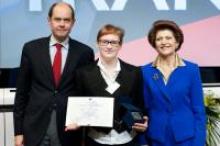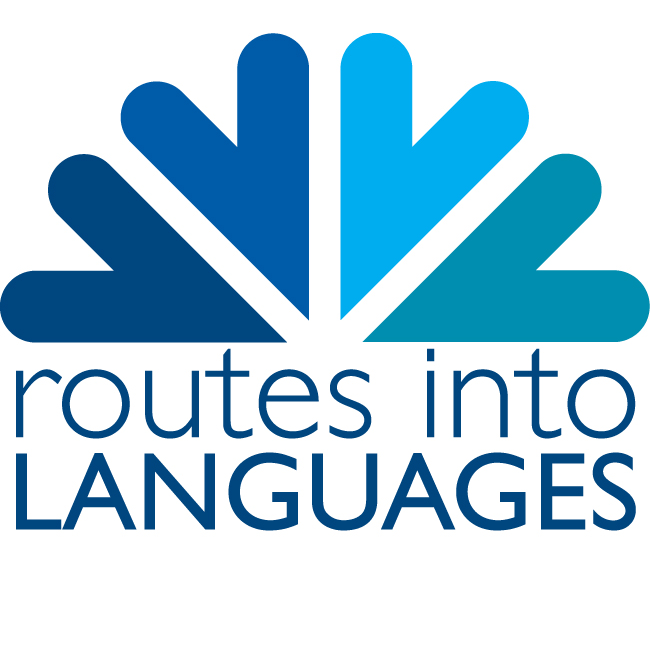
Thea Bradbury from Kendrick School in Reading recently took part in the European Commission's prestigious Juvenes Translatores (Young Translators) competition. Her efforts saw her become the 2011 winner for the United Kingdom. Read on for her account of the experience:
I really, really never expected to win the Juvenes Translatores competition. I entered it for fun, and forgot about it immediately afterwards, and was therefore astonished when the news came through that I would be travelling to Brussels for the award ceremony at the end of March. As the translation we’d done was itself was fairly short - we’d had two hours to translate a single A4 page - I assumed the ceremony would be correspondingly low-key. I was wrong.
The Brussels trip lasted three days, and evidence of my underestimation started long before we even reached the ceremony: I have never seen a car so shiny as the one which collected us from the station upon arrival. Clearly metal polish is where all those taxes that the Daily Mail complains about are going. The excitement continued as we were taken to our hotel, near the central Grand Place, and immediately given a box of chocolates by the Juvenes Translatores team (chocolate would rapidly turn out to be the defining theme of our visit).
We met for dinner that evening in the hotel restaurant, where all 27 winners were cruelly torn from the bosoms of their respective families and seated in a line, thereby forcing them to make stilted getting-to-know-you small talk with each other (I imagine things were still more awkward for the parents, who had to do the same). To my dismay if not surprise, English turned out to be the common language, thereby robbing me of the opportunity to practise my French and German. Fortunately, the arrival of the food broke the ice; the idea of ‘death by chocolate’ is apparently something every culture has in common. Things got even livelier later on, when we reconvened upstairs to listen to music and, at my instigation, to teach each other swearwords in our respective languages.
The next day was that of the ceremony, and I realised how badly I’d underestimated its importance when we arrived at a European Commission building adorned with not one, but two giant Juvenes Translatores posters. Inside, the room was filled not only with the parents and teachers I’d expected, but also with a vast assortment of translators, directors and dignitaries. As we waited for proceedings to get underway, we winners doodled on the official Directorate-General for Interpretation notepaper provided with official European Commission pencils.
The ceremony itself involved speeches by Androulla Vassiliou, the Commissioner for Multilingualism, and Rytis Martikonis, Acting Director-General of the Directorate-General for Translation, as well as a Swedish translator who told us about her travels in Mongolia. Whilst these were all extremely interesting, I have to admit that it was the interpretation that fascinated me the most. Just two English interpreters handled around ten different languages, not pausing at all when the speakers switched midflow from, say, French to Greek. Confusingly, the slight time lag between speech and interpretation meant that half the audience often started clapping before the other half had heard the end of a speech.
Along with the winners from Cyprus, Italy and Romania, I had volunteered to speak about my involvement in the contest and interest in languages. I did so in German, in order to illustrate a point about the notorious English laziness when it comes to learning other languages. It was whilst speaking that I discovered another intriguing side-effect of interpretation: when a speaker makes a joke, the laughter is staggered.
After the ceremony came a buffet, composed in no small part of the ubiquitous chocolate (which I was by now beginning to suspect actually constituted a food group in Belgium), followed by an photo session and a visit to the European Parliament visitors’ centre. However, the highlight of the trip for me came the next day, with our tour of the Directorate-General for Translation. Not only did we have the chance to speak to translators in the relevant departments and ask them questions; we were actually shown the documents that they use every day. Whilst not all of these documents could be said to be politically incendiary (agriculture was quite a big concern), they gained a certain glamour from their position at the beating heart of the EC. My nerdy little soul was also made joyful by a glimpse at a translator’s toolkit, ranging from up-to-the-minute internet vocabulary databases to the more traditional recourse of a really massive dictionary.
Soon enough, our visit was at an end and it was time to head back to the station and to our respective countries. The DGT had one last gift for us, however (besides more chocolate): a book each, in the language from which we translated during the contest. We winners parted with mutual sadness and promises to start a Juvenes Translatores Facebook group.
Throughout our visit, I was constantly amazed by the generosity and helpfulness of the Juvenes Translatores team and everyone else I encountered, and by how much they cared about encouraging and inspiring us winners. The visit crystallised my determination to become a translator, and I can think of no better aspiration than to work alongside the people I met during my too-short stay in Brussels.
The Routes South team would like to congratulate Thea for her wonderful achievement! For more details about the competition, click here.

